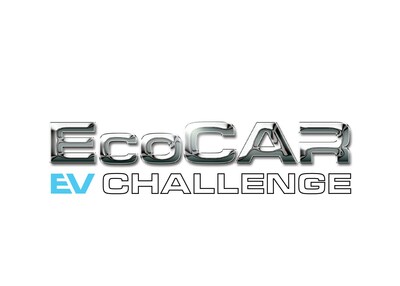West Virginia University and University of Alabama round out the top three
WASHINGTON, May 26, 2023 /PRNewswire/ — The Ohio State (OSU) & Wilberforce University Team has been named the winner of Year One of the EcoCAR Electric Vehicle (EV) Challenge, taking the lead in the four-year collegiate engineering competition. West Virginia University took second place and University of Alabama finished third in the judged competition, which was held from May 21–26, 2023 in Orlando, Florida.
Managed by Argonne National Laboratory and sponsored by the U.S. Department of Energy (DOE), General Motors, and MathWorks, the EcoCAR EV Challenge is a cross-disciplinary competition among 15 North American universities designed to build an EV talent pipeline through cutting edge automotive engineering education and practical application. Participating teams are tasked with complex, real-world technical EV challenges, including enhancing the propulsion system of a 2023 Cadillac LYRIQ to optimize energy efficiency while maintaining consumer expectations for performance and driving experience throughout the four-year competition. Diversity, equity, and inclusion are at the forefront of the EcoCAR EV Challenge, which promotes STEM to inspire the next generation of an EV workforce that is representative of all communities.
“Year One of EcoCAR is all about generating big ideas and developing a strategy for the remainder of the competition,” said Acting Assistant Secretary for Energy Efficiency and Renewable Energy Alejandro Moreno. “These students are already demonstrating the capacity and drive needed to pursue careers in the EV sector and become trailblazers in the mobility industry.”
While OSU has been in Advanced Vehicle Technology Competitions (AVTC) for more than two decades, this was the first time they chose to form a collaborative partnership with another school to compete in the program. Last fall, the team set out to establish a partnership with Wilberforce University (HBCU). This presented unique challenges with integration between the two groups of students, but the team has now proven they can compete successfully as one cohesive team. The Team excelled across all judged categories in Year One, earning top three finishes for 12 of the pre-competition deliverables, ten of which were first place finishes. The Team will take home $10,000 in prize money from industry sponsors.
In Year Two of the competition, each student team will receive a Cadillac LYRIQ, a next-generation battery electric vehicle (BEV) provided by GM. Teams will be tasked with reengineering the vehicle to add new energy efficient and customer-friendly features designed to address the decarbonization needs of the automotive industry.
“As a proud EcoCAR sponsor, we are honored to continue to provide the tools and training to help build the next generation of EV talent,” stated Ken Morris, Vice President Electric and Autonomous Vehicles at GM. “As this competition progresses, we look forward to seeing how the students incorporate their ideas from this year and put their skills to the test in reengineering their Cadillac LYRIQs. We congratulate the Ohio State & Wilberforce Team on their first-year win and are excited to see what the remainder of the competition has in store.”
“The Team’s complex embedded system designs were impressive,” said Lauren Tabolinsky, Global Academic Student Programs Manager at MathWorks. “We look forward to seeing the teams continue to use MATLAB and Simulink to build and simulate their EV designs throughout the duration of the multi-year competition.”
For more information about the EcoCAR EV Challenge, please visit avtcseries.org.
About EcoCAR EV Challenge:
Managed by Argonne National Laboratory and sponsored by DOE, General Motors, and MathWorks, the EcoCAR EV Challenge is a four-year collegiate engineering program that builds on the successful 35-year history of Department of Energy Advanced Vehicle Technology Competitions (AVTC), which exemplifies the power of government/industry partnerships to address our nation’s toughest energy and mobility challenges and provide practical skills to the future leaders of the transportation workforce.
General Motors provides each of the competing teams with a Cadillac LYRIQ – the brand’s first all-electric vehicle built on GM’s Ultium Platform which encompasses a common set of propulsion components – battery cells, modules, packs, and a family for Ultium Drive units. GM also provides vehicle components, seed money, technical mentoring, and operational support.
A foundational principle of EcoCAR is the use of Model-Based Design, a mathematical and visual design approach using MATLAB and Simulink that enables users to manage projects quickly and cost-effectively, collaborate on designs, and develop complex embedded systems. MathWorks provides teams with a full suite of software tools, simulation models, training, technical mentoring, and operational support.
The U.S. Department of Energy and its research and development facility, Argonne National Laboratory, provide competition management, team evaluation and logistical support. Other sponsors provide hardware, software, and training.
Reference to any specific commercial product, process, or service by trade name, trademark, manufacturer, or otherwise does not constitute or imply the U.S. Department of Energy’s endorsement, recommendation, or favoring by the U.S. Government or any agency thereof. The Department of Energy’s role in this competition does not include the solicitation or selection of sponsorships, nor does it include the establishment of sponsorship criteria.
Contact: Kimberly DeClark, EcoCAR
(202) 441-0096
![]() View original content to download multimedia:https://www.prnewswire.com/news-releases/the-ohio-state-university–wilberforce-university-team-claims-top-spot-in-year-one-of-the-ecocar-ev-challenge-301835406.html
View original content to download multimedia:https://www.prnewswire.com/news-releases/the-ohio-state-university–wilberforce-university-team-claims-top-spot-in-year-one-of-the-ecocar-ev-challenge-301835406.html
SOURCE EcoCAR EV Challenge



